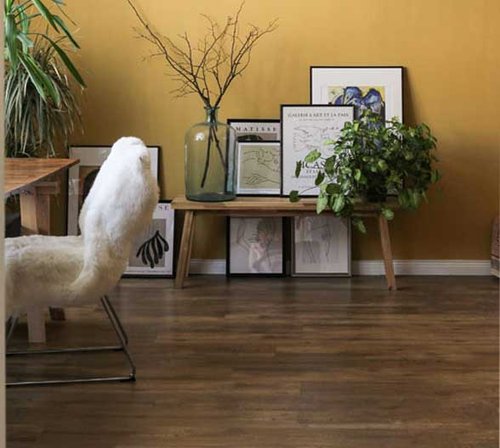Pros & Cons of Luxury Vinyl Plank (LVP) Flooring

Durability: LVP is known for its durability, particularly its resistance to scratches, dents, and stains. Many brands feature a robust wear layer that can withstand the demands of busy households, including pets and children. This makes it a great choice for high-traffic areas like entryways, hallways, and kitchens.
Waterproof: A significant advantage of LVP is its waterproof nature. Unlike hardwood, which can warp or swell with moisture exposure, LVP is well-suited for moisture-prone areas like bathrooms, kitchens, and basements. However, it is important to note that LVP is water-resistant, not flood-proof. Excessive standing water can still seep into seams and cause damage.
Affordability: LVP is generally more cost-effective than hardwood, stone, or ceramic tile. The material itself is less expensive, and the installation process is often quicker and simpler, which can reduce labor costs.
Variety and Aesthetics: LVP is available in a wide array of styles, colors, and textures, offering convincing imitations of natural wood and stone. This allows for great design flexibility, enabling you to achieve the look of high-end flooring without the high cost.
Easy to Maintain: LVP flooring is exceptionally low-maintenance. It does not require waxing, polishing, or special sealing. Routine cleaning typically only involves sweeping, vacuuming, or mopping with a damp cloth.
Certifications: Many LVP products carry certifications that assure their quality and safety.
FloorScore®: This certification is a recognized standard for indoor air quality (IAQ) for hard surface flooring. It signifies that a product has been tested and meets strict standards for low emissions of volatile organic compounds (VOCs), which can contribute to better indoor air quality.
GREENGUARD: Similar to FloorScore®, GREENGUARD certification (including GREENGUARD Gold) indicates that a product has been tested for chemical emissions and is certified to have low VOC levels. This is especially important for products used in schools, healthcare facilities, and homes where air quality is a key concern.
Disadvantages of LVP Flooring
Susceptibility to Damage: While durable against scratches and stains, LVP can still be damaged. Heavy, sharp objects can dent the surface, and direct, prolonged exposure to sunlight can cause fading over time.
Difficulty of Repair: If a plank is significantly damaged, it can be difficult to repair without replacing the entire piece. While click-lock LVP planks are easier to replace, glue-down installations can be much more challenging.
Lack of Resale Value: Unlike genuine hardwood floors, LVP typically does not increase a home's resale value. While it can enhance the aesthetic appeal, it is generally not seen as a premium feature by homebuyers.
Environmental Concerns: LVP is a synthetic product made from plastics, which means it is not biodegradable. Some lower-quality brands may also contain higher levels of VOCs, although this can be mitigated by choosing products with certifications like FloorScore® or GREENGUARD.Consulting with flooring professionals can also provide valuable guidance based on your specific circumstances.
